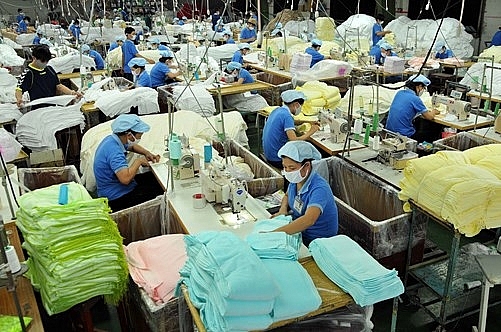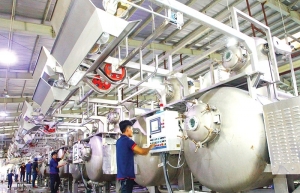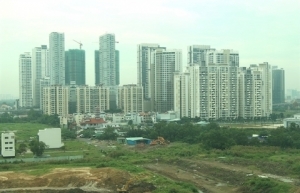Rising market exits highlight need for more policy support to survive COVID-19
 |
More than a year since the COVID-19 pandemic occurred, enterprises and labourers are struggling to survive despite efforts to optimise operations and the supporting policies from the government, ministries, and local authorities.
After the difficulties of 2020, logistics is forecast to continue seeing challenges in 2021. Like others, Bee Logistics is seeking measures to cut costs, thus reducing prices for customers to maintain business activities.
Challenges remain
Logistics is one of the sectors facing hardships during COVID-19. According to the Vietnam Chamber of Commerce and Industry (VCCI), the hardest-hit sectors remain tourism, retail, passenger transportation, manufacturing of motor vehicles, and beverage.
As shown by the General Statistics Office (GSO), in the first quarter of 2021, the number of newly-established businesses reached 29,300, down 1.4 per cent on-year, while the number of those exiting the market hit 40,323, up 15.5 per cent on-year. On average, 13,400 enterprises exit the market each month.
Economists said that this is the first time in the past decade that the number of businesses exiting the market is higher than those established, causing great concerns and demontrating the impact of the global health crisis.
According to the report on COVID-19 impacts on Vietnamese businesses jointly announced by the Vietnam Chamber of Commerce and Industry (VCCI) and the World Bank on March 12, the pandemic outbreak took its toll on the business community in Vietnam, as 87.2 per cent of them are suffering from “mostly" or "completely negative" impacts.
Not only domestic private companies but also foreign-invested enterprises (FIEs) were adversely affected. Private companies rocked the most were in the garment and textile (97 per cent), ICT (96 per cent), and manufacturing of electrical equipment (94 per cent) sectors.
Meanwhile, the hardest-hit FIEs were in the sectors of real estate (100 per cent), ICT (97 per cent), and agriculture/fishery (95 per cent).
In addition, the number of working age people losing their jobs continued to rise, hitting nearly 1.1 million in the first quarter, rising by 12,000 from the same period last year, reflecting the continuous challenges in business.
Stable tax policy essential for sustained growth
According to economists, businesses are in urgent need of support to maintain operations. While preventing and fighting against the pandemic, it is necessary to continue reforming economic institutions and helping companies ease their difficulties.
On April 19, the government issued Decree No.52/2021/ND-CP on extension of time limits for payment of VAT, corporate income tax (CIT), personal income tax, and land rental in 2021. The new decree covers a wide range of sectors and businesses, including small- and micro-sized enterprises, easing their challenges.
Senior economist Tran Dinh Thien said in addition to the supporting policies, businesses need a stable policy environment. It should not increase taxes and fees this time.
Dau Anh Tuan, head of the Legal Department under Vietnam Chamber of Commerce and Industry (VCCI), said the most common proposals from business community is not to increase taxes and fees. In this challenging period, any increase will be cause for concern. He went on to elaborate that the tax policy is the most important line of support the government can provide businesses.
According to the Vietnam Institute for Economic and Policy Research (VEPR), tax reforms should be made towards increasing efficiency of tax collection, instead of raising indirect tax lines.
In fact, an increase in tax and fees not only affects businesses but also people. According to the VEPR, consumers with the lowest income consumers often suffering the most from special consumption tax, which make up about 3.47 per cent of their annual income.
Vietnam is a lower-middle income nation. Therefore, any increase in tax and fees will impact all consumers, especially the poor who are already hit the worst by the pandemic.
Increasing taxes and fees also negatively affect the purchasing power and revenue of businesses, thus leading to a decrease in revenue, redundancies, and a rise in unemployment.
In the world, many countries have been offering preferential tax measures to help businesses weather the COVID-19 storm. For example, China provides value-added tax (VAT) exemption to providers of certain services, while extending time limits for CIT payment. Similarly, the US maintains preferential tax policies, including tax payment extensions, reductions, and other measures.
Hong Sun, vice chairman of the Korea Chamber of Business in Vietnam (KorCham), told VIR, “Vietnam’s supporting policies are not as high as those in other countries like the US, the UK, Japan, or South Korea where the governments give direct support to small firms. Vietnam, instead, offers an extension of time limits for tax payment so that businesses can stay alive, stand firm, and recover, and then make tax payments.”
The COVID-19 pandemic is forecast to continue being a source of serious impacts globally. Ministries and relevant agencies should make further studies and then propose the government to maintain supporting policies for businesses to help them recover and then expand investment and business activities in 2021-2025.
"This is not the right time to increase tax or apply a new tax policy. The country, instead, need to have long-term policies to grow more sustainably," he added.
 Tax filing extension a modicum of relief Tax filing extension a modicum of relief |
 Further scrutiny required before introducing property tax overhaul Further scrutiny required before introducing property tax overhaul |
 Tax policies for property sector must be carefully studied: finance ministry Tax policies for property sector must be carefully studied: finance ministry |
What the stars mean:
★ Poor ★ ★ Promising ★★★ Good ★★★★ Very good ★★★★★ Exceptional
 Tag:
Tag:
Related Contents
Latest News
More News
- Japanese business outlook in Vietnam turns more optimistic (January 28, 2026 | 09:54)
- Foreign leaders extend congratulations to Party General Secretary To Lam (January 25, 2026 | 10:01)
- 14th National Party Congress wraps up with success (January 25, 2026 | 09:49)
- Congratulations from VFF Central Committee's int’l partners to 14th National Party Congress (January 25, 2026 | 09:46)
- 14th Party Central Committee unanimously elects To Lam as General Secretary (January 23, 2026 | 16:22)
- Worldwide congratulations underscore confidence in Vietnam’s 14th Party Congress (January 23, 2026 | 09:02)
- Political parties, organisations, int’l friends send congratulations to 14th National Party Congress (January 22, 2026 | 09:33)
- Press release on second working day of 14th National Party Congress (January 22, 2026 | 09:19)
- 14th National Party Congress: Japanese media highlight Vietnam’s growth targets (January 21, 2026 | 09:46)
- 14th National Party Congress: Driving force for Vietnam to continue renewal, innovation, breakthroughs (January 21, 2026 | 09:42)

























 Mobile Version
Mobile Version